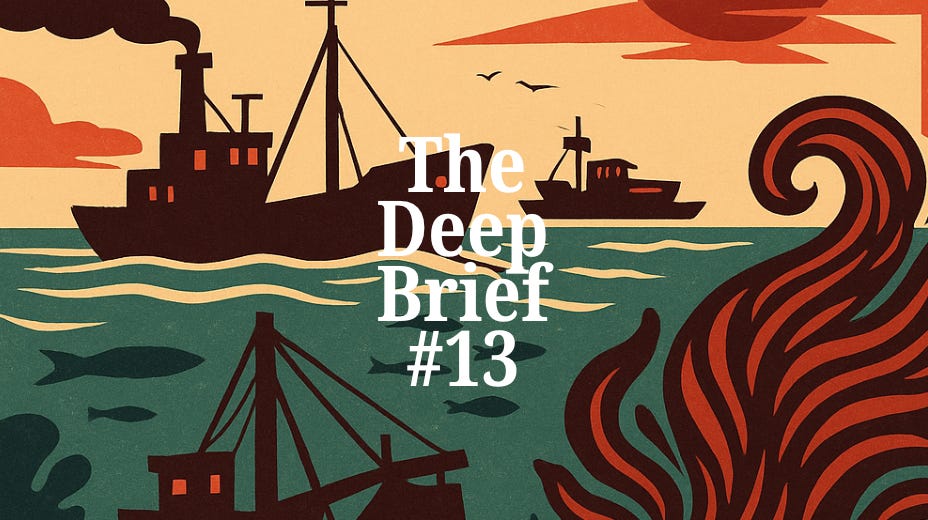The Deep Brief #13 | 13 September 2025
Your end-of-week ocean intelligence, built to inform, agitate and equip you
Each week, I pull together the most urgent, overlooked, and powerful stories shaping our relationship with the sea. It is unfiltered, sometimes uncomfortable, but most definitely unmissable.
Three deep dives. Three quick hits. One hard truth from the sea.
Deep Dives
Bottom trawling to continue in English protected waters
The UK has confirmed that bottom trawlers can keep operating inside “protected” waters. The government’s ruling applies to several Marine Protected Areas where conservationists had hoped for stricter controls. Heavy gear on fragile seabeds threatens recovery of habitats and species, raising questions about what “protection” means in practice and how enforcement will work at sea.
Read more →
Landmark UK ocean legislation
The UK has passed new laws to crack down on illegal fishing and strengthen ocean protections. The legislation aims to tighten supply chains, support global marine protections, and improve monitoring beyond national waters. Its impact will depend on implementation timelines, penalties, and collaboration with coastal states.
Read more →
The Atlantic’s moving belt of seaweed
A sargassum belt the size of continents now stretches from West Africa to the Caribbean. Satellites track its vast growth across the Atlantic as climate and nutrient shifts alter bloom patterns. Communities face costly cleanups while researchers test uses for harvested seaweed that do not create new environmental problems.
Read more →
Three Quick Hits
Weird balls and hopeful fixes
Strange new inventions could help heal the sea. From spherical devices to unconventional restoration methods, a wave of experimental ideas is emerging where conventional approaches have stalled.
More →
Europe’s Virtual Ocean Platform
Europe has built a digital twin of its seas. This virtual platform allows policymakers to test scenarios before acting, offering a powerful new tool to speed up marine protection decisions.
More →
DNA tracks climate responses
Bottles of seawater are now biodiversity surveys. Environmental DNA is revealing how species are shifting with ocean warming, turning simple water samples into real-time ecological intelligence.
More →
One Hard Truth
Corporate reports still miss the ocean
Most corporate sustainability reports still overlook the ocean as a core business risk.
Material threats from marine heatwaves, fishery declines, and coastal damage are often buried under “climate” categories or ignored altogether. The result is glossy narratives that leave investors blind to the real exposure.
The gap matters.
Ocean change drives financial risk through supply chains, insurance claims, infrastructure damage, and resource volatility. Fisheries collapses ripple into food prices, extreme weather inflates disaster costs, and shipping routes face disruption from sea level rise and shifting ice. Tourism operators face mounting losses as bleaching corals and polluted beaches undermine their core product. Yet many companies continue to frame ocean risks as reputational, not operational or financial.
The hard truth is that ocean health is not an externality. It is capital. Every tonne of carbon absorbed, every reef protecting a shoreline, every mangrove filtering water is part of the balance sheet of stability. Ignoring it in corporate reports does not make the risk disappear. It makes the eventual crash harder to predict and harder to manage.
The challenge for the next decade is not simply for companies to publish more reports, but to measure and disclose the ocean connections that already define their bottom lines. Shipping, seafood, and coastal tourism depend on it most directly, yet every sector tied to global trade or food security is exposed. Until reporting aligns with reality, the gap between financial comfort and ecological collapse will only widen.
Read more →
Final Thought
Protection on paper is not protection in the water. Laws only matter when they change what happens on the seabed, at the net, and along the supply chain. Models and digital twins can guide smarter choices, and DNA can show what is shifting beneath the surface. The work still comes down to whether policy closes the gap between promise and practice.
This week’s stories circle around that same gap. A government that calls waters “protected” while allowing trawlers to scrape the seabed. A landmark law that may stall without enforcement. A seaweed belt crossing an ocean, transforming coasts whether nations are ready or not. Corporate reports that highlight climate while neglecting the ocean systems that keep those very markets alive.
Resilience in the ocean is still possible, but it is not automatic. Technology can extend our vision, yet it cannot enforce decisions. Science can explain what is happening, yet it cannot implement solutions. Real progress depends not only on knowledge, but on the willingness to act on it before the thresholds close.
The ocean does not ask us to save it. It asks us to stop pushing it past the point of no return.
Thank you to everyone who has become a Founding Member or paid subscriber this week. Your support keeps these stories free for anyone, anywhere, because the ocean’s truth should never be locked behind a paywall.
See you next week.
– Luke



